What are bed bugs?
Bed bugs are essentially parasites. They are tiny insects which live on animals and humans and feed on their blood. They can be found in beds and tiny cracks and crevices. Their bodies are flat, they have three pairs of legs (a total of six) and a pair of antennas. However, they are very tiny, and the infested rarely sees them (but it’s possible). Luckily they don’t fly, or jump high like fleas, but they can move very quickly over any surface.
Female bed bugs can lay even a few hundred eggs over their lifetime. The eggs can’t be seen, as they are as tiny as a speck of sand or dust. The biggest problems are so-called nymphs – which are immature bed bugs that feast on our blood. They need the nutrients from our blood so they can shed their skin, up to five times before they reach maturity.
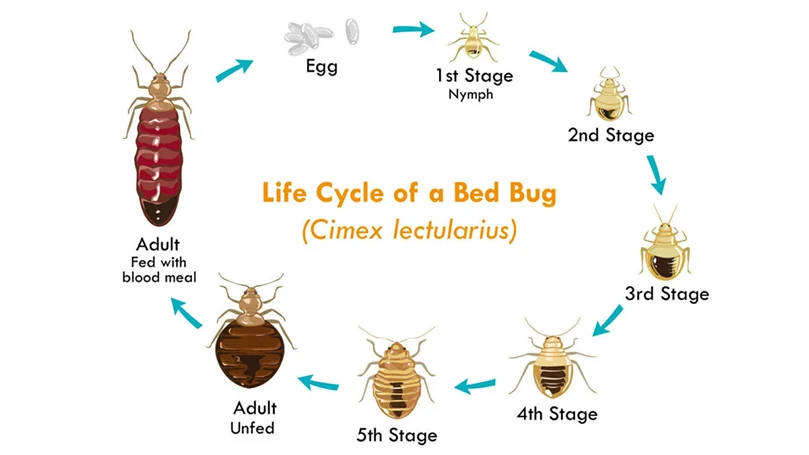
Why do we get a skin rash when a bed bug bites?
When the bed bug or the nymph bites us, they release their saliva which contains an anticoagulant and anesthetic. That way they can suck on blood without us noticing it or feeling any pain while they do that. The skin rash that occurs once we have a bed bug infestation is a direct consequence of exactly that, similarly to when we have an allergic reaction when a mosquito bites us. However, the difference is that bed bugs are tinier and in much larger number, and bite often where the skin is the thinnest and has a lot of blood vessels in. Mainly between our fingers and toes, sides of our stomach and stomach itself, neck, and the crevices around joints (armpit, knee pit, elbow, et cetera).
How does a bed bug bite look like?
A bed bug bite allergic reaction can vary from the way the bed bug has bitten and of course the host. You can recognize a bed bug bite – there is either a big cluster of red and irritated skin, or multiple consecutive bites forming a line or rather a “constellation”, which means that a bed bug has taking bite per bite, and just moving an inch or two for the next. When a bed bug is filled with the host’s blood, they are plump and become a reddish color. The reaction of the host can also vary, depending on skin sensitivity and immune system of the host. Sometimes you will see very irritated and red skin, and sometimes just a few tiny bites. Some even go completely unnoticed.
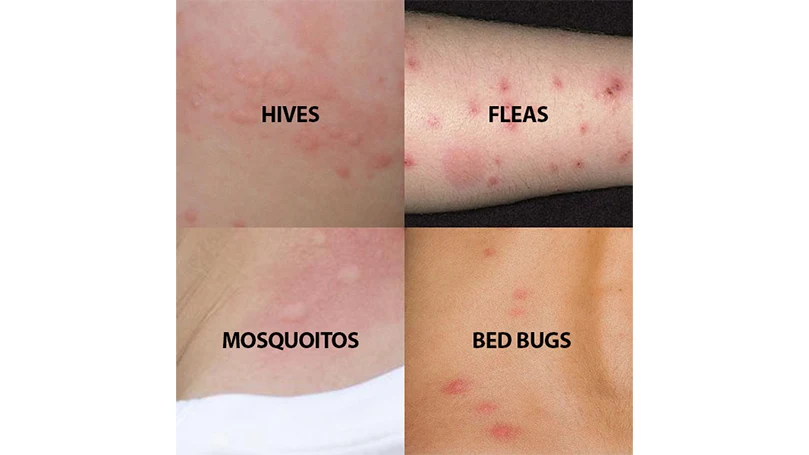
How can your home get infested with bed bugs?
An infestation of bed bugs can occur when people do some of the following:
- Buy second-hand furniture that comes from an infested area (or take one from outside)
- Come in touch with a person wearing clothes infested with bed bugs
- They also come into your home through unattended luggage
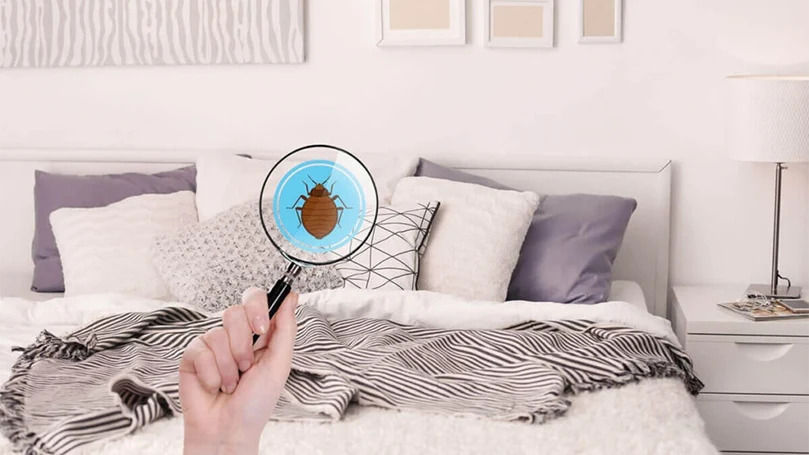
How to recognize a bed bug infestation?
You can’t determine if there is a bed bug infestation in your home by simply finding bites and rashes on your skin. That is insufficient evidence, especially if you’re going to call pest control. To absolutely make sure you’re dealing with bed bugs, do the following things:
- Look in crevices in the bed, look through seams in pillows, mattresses and sheets. If there is a bed bug infestation, you will definitely see a bed bug or two. They are usually the size from 1mm to 7mm, approximately the size of an apple seed.
- Look for bed bug excrements. If they feed on your flesh, that also means that they will leave a trace on your bed. Tiny brown or black excrements are a clear sign of bed bug infestation.
- As we’ve mentioned, nymphs shed their skin every so often, so you will definitely find their remains (light brown).
- If you feel an uncomfortable smell in your beddings – usually the musty odor comes from the bugs’ scent glands.
- Traces of blood on sheets are also a clear sign. You may toss and turn in your bed, squishing a bed bug which then releases the blood it’s eaten.
When you recognize these signs and really make sure that there is indeed a bed bug infestation, you need to follow our complete guide on how to get rid of them.
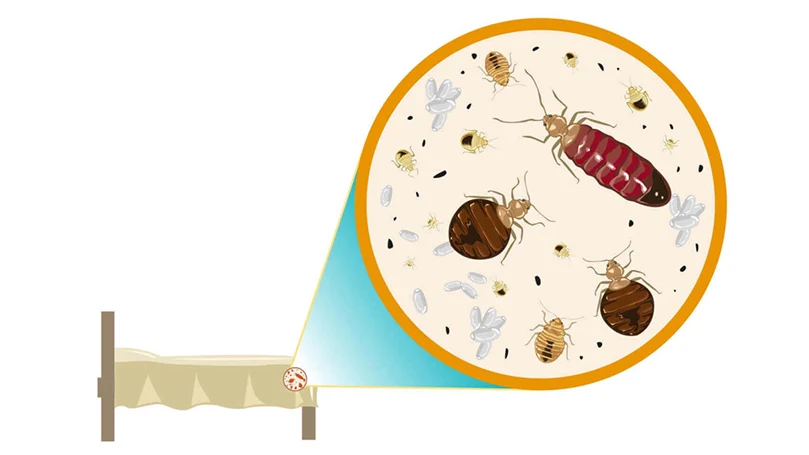
Guide to getting rid of bed bugs
Although they might be called bed bugs, beds are not the only places they can live in. Any kind of furniture, especially ones with crevices and dark corners can be infested with them. Also, check your carpets, personal computer, and other places you might spend a lot of time in during the day. There are many professionals you can turn to when it comes to treating your home for bed bugs, but there are also methods you can do by yourself, and we are going to share them with you.
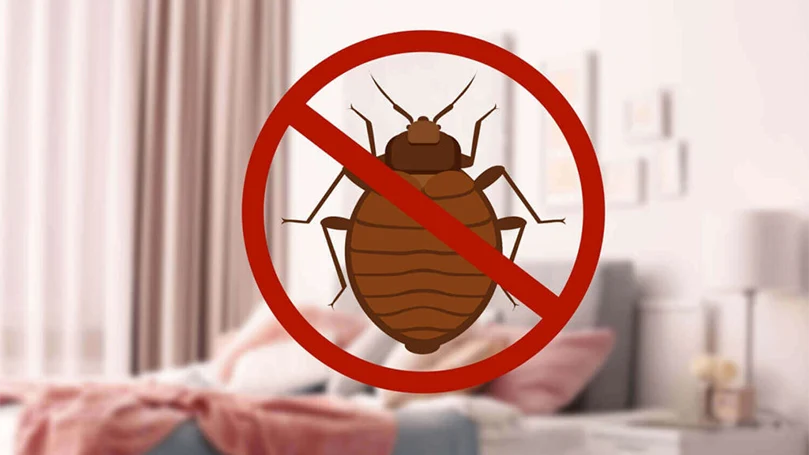
Before you start the bed bug treatment
You need to prepare your whole home for the treatment – that includes every room that has a possibility of bed bug infestation. Hopefully, you can limit your infestation to only bedrooms and the living room, but if you're uncertain, threat your home in its entirety. Here's what you gonna do:
- First get rid of clutter. Clutter is a safe haven for bed bugs. They can find dark places to hide in and crawl out during night to munch on our blood. Make sure to sweep through your whole house, get rid of everything you don't need and create as much space as possible around your bed and furniture. Also, if you're getting rid of things that are probably bed bug infested, make sure you bag them correctly in order to avoid infesting someone else.
- Linens, clothes and beddings need to be washed and dried at the highest temperature possible because bed bugs cannot survive them. If you can't do that for some garments, dry cleaning might help, but it's advisable to simply get rid of it.
- Dismantle bed frames of all beds located in infested areas. You need to dismantle them because that way you will have access to the bed bug hiding places and treat them accordingly. All crevices and holes should be thoroughly inspected for bed bugs.
- Take care of all the mattresses. You have a number of options. If your mattress is infested, you can either encase it and leave it outside for a few months. The bed bugs can't survive that long without blood food. The problem is, of course, to find a suitable place to sleep in during that time. Air mattresses are a cheap temporary solution, and after you've treated the place for bed bugs, there is no way they can re-infest an air mattress.
- Remove all drawers and clean all the closets. Bed bugs can also be found in drawers and in holes and crevices in dressers. Make sure to clean them thoroughly.
- When you clean all surfaces, make sure you thoroughly rub them and scrub them to dislodge bed bug eggs. Vacuuming is also advisable – do it all over the place. Do not use a bristle attachment though – bed bugs can cling to it and you can transfer them by accident to other areas.
- Inspect the following areas for bed bug nests: mattresses, bed frames, drawers, box spring, other furniture (couch, sofa, chairs), walls (especially if you have wallpapers), carpets and electronics and appliances (clean the computer keyboard for example).
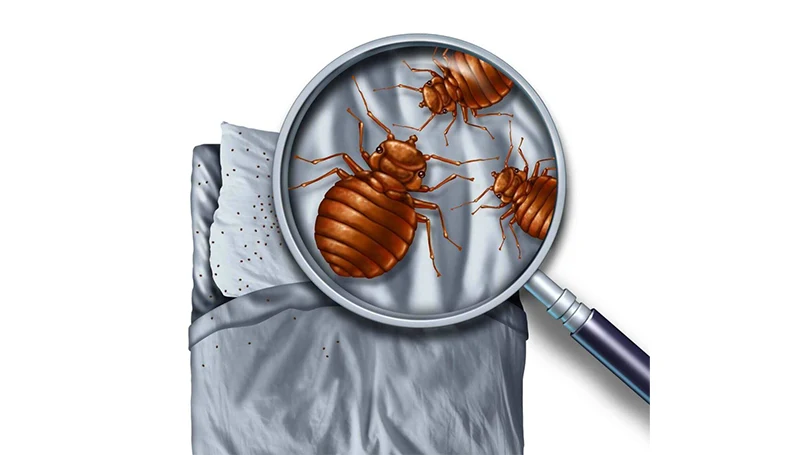
Treating your mattress
If you decide not to throw your mattress out, there are ways you can treat it.
To treat your mattress for bed bugs successfully, you need to buy a special encasement for the mattress and a separate encasement for the box spring. You will treat the mattress for bed bugs, but you can’t thoroughly exterminate them, especially if there are tears in the fabric, where they can easily crawl in. Find suitable and certified bed bug encasement that will enable you to use your mattress for a long time, even after they all die out of hunger (which is 4-6 months). The bed bugs cannot escape from these kind of encasements, so you can rest peacefully.
Encasements aren’t the only solution, though. You have various insecticides you can use against bed bugs, but bear in mind that not a lot of it can be used if the bed bugs are inside the mattress. You need to make it friendly to sleep on after all. First vacuum the mattress thoroughly, and then apply the insecticide (residual – spray or dust) on the mattress. Pay special attention to the cracks and crevices.
You can also use steam to kill the bed bug eggs. The eggs cannot endure high temperatures, so a steamer can help with getting rid of their offspring, therefore prohibiting further infestation. Steam is also a very safe and family friendly solution that doesn’t give any side effects or pose as a health threat.
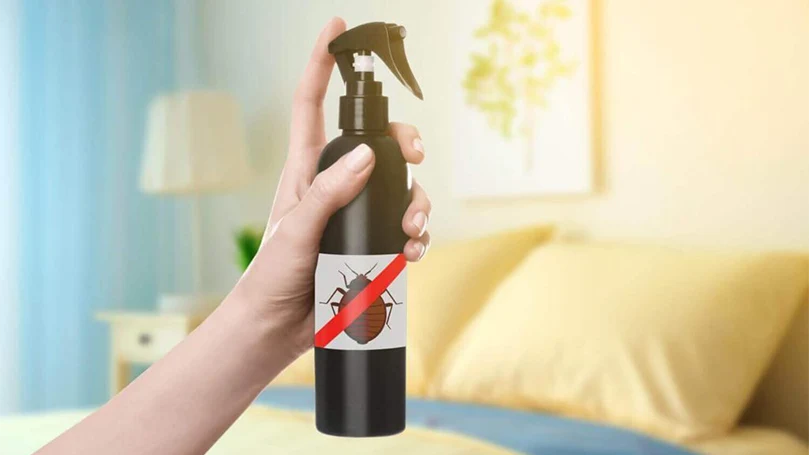
Treating the rest of your home
Then comes the big project – treating your whole living area and rooms infested. For the treatment, you can use residual liquid, aerosol or dust residual insecticides. One is usually not enough. You need to have a combination of these insecticides because they can be applied differently on different areas, making it easier for you to treat your home.
Spray and apply the insecticides to the following places:
- Inside drawers and dressers (remove the drawers first, spray insecticide around them and at the bottom, not inside), and if you put clothes back in make sure to clean the inside of the drawer beforehand.
- Spray all of the doors, closet doors, and insides of the closet. Also, apply insecticide around your windows and other jointed furniture in the house.
- Spray all the places where furniture touches the floor.
- Apply insecticide to all the corners in the house, behind bed frames, around nightstands and on moldings.
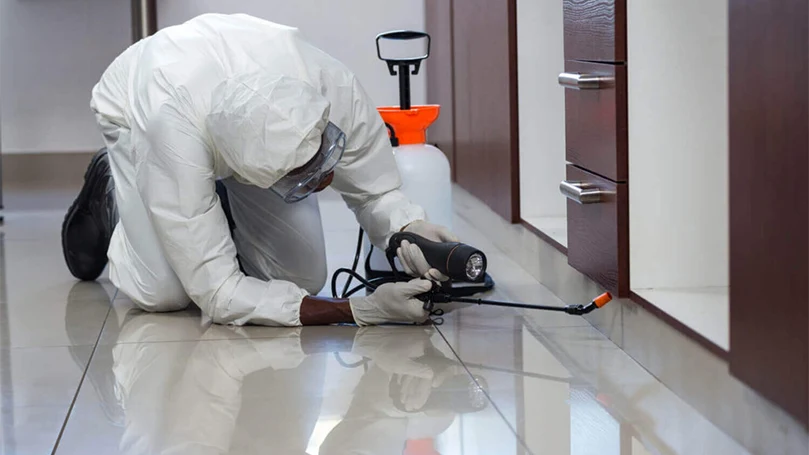
How to treat bed bed bites?
Bed bug bites can be a real nightmare. Depending on the way your body reacts to their saliva, you can have a myriad of skin irritations. Visiting a dermatologist is always a good option to get the right treatment for your skin. It can reduce inflammation and itching, making it easier to sleep at night. There are some ointments that you can only buy with a prescription from the doctor, and they can really help. These ointments are mainly topical corticosteroid ointments that relieve itching but may sting a little.
To relieve an itch where the bed bugs might have bitten, you can apply cold water and wash it with soap. Other useful things that relieve bed bug bites are: antihistamines, calamine lotion, anti-itch creams, pain relief drugs (i.e. ibuprofen).
You should immediately go visit your physician if bed bug bites start to complicate. Complications may include blisters, skin infections that appear due to scratching, serious inflammations and allergic reactions.
Truths and myths about bed bugs
There are bed bugs myths that are interesting. If you are wondering if these are true, below are some of the most common ones that you can hear.
Myth: Bed bugs carry disease
False. Bed bugs may cause the host to have an allergic reaction, blisters and get a skin infection due to scratching, but they cannot transmit any serious diseases. Any complications that may occur depend on your immune system, your skin sensitivity, and the amount of bites you get.
Myth: Bed bugs only bite at night
False. Although there can be some distinctions, there usually isn’t enough evidence to determine whether it’s a bed bug bite, a flea bite, or a simple mosquito bite.
Myth: Bed bugs travel by clothes
True. They also travel by suitcases or other things that they can hang themselves on. That’s why it’s important to check for bed bugs when you come back from a trip.
Myth: You can starve bed bugs to death
Partially true. Although there are different reports coming from all kinds of research, the bottom line is that a bed bug indeed can live without food for a long time. However, they have to be adult bed bugs and have to live at a steady temperature (10 °C) for the duration. Nymphs starve very quickly because they have to feed often, so they can live 2 weeks tops.
Myth: Some people don't have marks indicative of bed bug bits
True. There are some people who can’t get skin irritation from bed bug bites. The only way to be completely sure is to locate a bed bug first hand.
Myth: Bed bugs infest only places with low hygiene
False. Even a spotless house or apartment can become a home to bed bugs. You can infest your home with a bed bug even if you bring one fertile female bed bug.
Myth: Bed bugs are scared of light
False. Yes, you can. Unless you have problems with sight, it’s fairly easy to locate a bed bug, or even a nymph. It’s the eggs that are a bit difficult to pinpoint.
Myth: You can't feel a bed bug bite
True. Like we previously mentioned, they have saliva which is rich in anticoagulant and anesthetic, so you won’t feel them biting you. Only one day after does the skin show irritation from the bite.
How to avoid bed bug infestation?
- There are some security measures that you always need to see through in order to keep your home bed bug free. Here is a list of things that you have to consider when it comes to bed bug infestation prevention:
- If you’re buying second-hand furniture – make sure you check them thoroughly for bed bugs.
- A protective cover for a mattress is always a great idea to prevent them from finding a hiding place.
- Make sure your home is uncluttered and clean. Tiny cracks, holes, and dark corners are a haven for bed bugs. Vacuum regularly, to get rid of any that hitchhiked and ended in your home by accident.
- Using shared laundry facilities poses as a big risk of getting a few bed bugs in your home. We advise you to be really cautious when using those services.
- When travelling, never leave your suitcase on the floor. That way the bed bugs won’t be able to clutch onto the suitcase.
- Also, if you’re staying somewhere else, make sure you thoroughly check your baggage and wash all of your clothes when you get home.
- If you have a storage space for seasonal clothes, pack them in a vacuum sealed bag to prevent any pests from getting to them.

Conclusion
Hopefully, this article is going to give you a greater grasp on what bed bugs are, how to prevent your home from being infested, and many more. If you ever see any signs of bed bugs, you need to act immediately. They can reproduce at a very high and quick rate, and can even move from one apartment to another. Make sure you provide your family proper medical care, and then call pest control and do all of the aforementioned things. Besides being a major bother, and causing you to lose sleep at night because of the itching, bed bugs don’t pose as a huge threat to humanity.















There are no comments yet
"*" indicates required fields